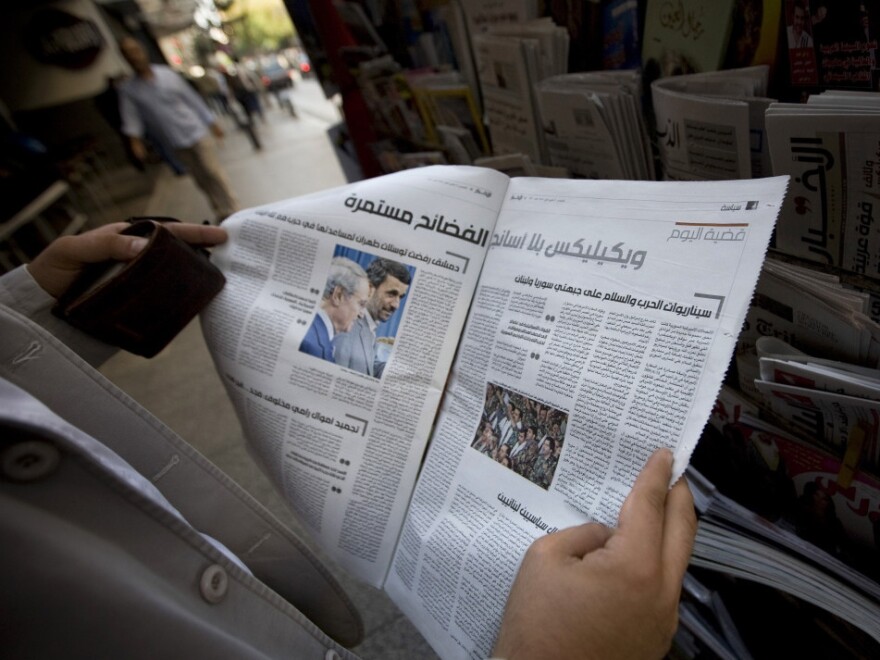After three months of demonstrations in Syria, it is a daily struggle to get an accurate picture of events. The Syrian government has banned most international media, and Syria's state TV presents an official version contradicted by an anti-regime protest movement that bolsters its narrative with video clips and Facebook postings.
In neighboring Lebanon, even news editors supportive of President Bashar Assad's regime say Syria is losing credibility in the media war.
A Lebanese Paper, Close To Syria
In its five years on newsstands, the Lebanese newspaper Al-Akhbar has gained a bold reputation. It was the first Lebanese paper to publish exclusive WikiLeaks cables, investigate the abuse of domestic workers and highlight prison conditions.
Omar Nashabe, who is on the paper's editorial board, says Al-Akhbarwants to be known for raising the standards of journalism in the region. The paper is also known for anti-U.S. editorials and ties to the Shiite group Hezbollah.
"We are known in the media, especially in the Western media, as being close to Hezbollah," Nashabe says.
The paper is also close to Hezbollah's ally Syria, he says, which has put the paper's journalists under considerable strain.
"It is a very delicate matter. We are a small country next to a larger country. This is basic Geopolitics 101," Nashabe says.
Asked if he thinks the Lebanese worry that the unrest in Syria will spill over into their country, he says, "I think so. I think they worry, and it's an understatement."
Al-Akhbarhas been caught up in media war over Syrian coverage. While editorials in the newspaper are pro-regime, one contributor was beaten and detained by plainclothes police in the Syrian capital, Damascus. Al-Akhbar's journalists now report the story by phone.
Straining To Believe State TV
But events in the northern Syrian town of Jisr al-Shughour further strained the newspaper's balance of credible journalism and politics.
When the Syrian army cracked down on towns in the north, thousands of Syrian refugees escaped to Turkey and gave eyewitness accounts of a military mutiny and a brutal military assault on civilians. The Syrian government insists armed gangs are to blame and that residents called the army to save them.
Nashabe says he had no journalists on the ground to check on the government's claim concerning what happened in Jisr al-Shughour.
"You don't know if they are lying, that's worse. So, you think they are saying something that is not true, or partly true — interpreting it in a way," Nashabe says.
Syrian television broadcast what it said was the confession of a man said to be part of the gang that killed 120 security personnel in Jisr al-Shughour. He said he got arms from Turkey and money from a shadowy resistance group. He told his military interrogator that he attacked the security personnel and cut them up.
But even Nashabe strains to believe the Syrian account.
"Is it true, this guy, who comes up and talks about this mass grave?" he asks. "I don't know. Who killed these people? Is there an investigation?"
'They Lie And People Know They Are Lying'
Political science professor Hilal Khashan also monitors Syrian TV. He says Syria's propaganda has become more blatant as the crisis grinds on.
"They lie and people know they are lying and they don't seem to care," Khashan says. "One of the soldiers digging the mass grave was wearing a mask. It is not in the habit of the Syrian army when they dig graves. They went prepared to the site. They knew what they were after."
It is a media campaign, says Khashan, whose audience is the regime's staunchest supporters: the business community Syrian minorities who fear chaos could follow a successful challenge to the government.
"They are waging a physical survival battle, and when it comes to the survival of the regime, it doesn't matter how they conduct their media battle," Khashan says.
But even Syria's closest allies in Lebanon are raising questions about a strategy that seems to fuel the protests with each passing week.
Copyright 2020 NPR. To see more, visit https://www.npr.org. 9(MDAxNDQ2NDAxMDEyNzU2NzM2ODA3ZGI1ZA001))




